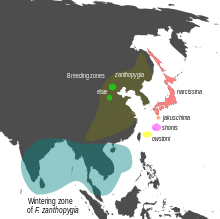Narcissus flycatcher: Difference between revisions
taxobox cleanup |
Mr.McNuggets (talk | contribs) Replaced image of female with one in which the subject is more prominent Tags: Mobile edit Mobile web edit Advanced mobile edit |
||
| Line 4: | Line 4: | ||
| image = Narcissus Flycatcher-cropped.jpg |
| image = Narcissus Flycatcher-cropped.jpg |
||
| image_caption = Male in Osaka, Japan |
| image_caption = Male in Osaka, Japan |
||
| image2 = |
| image2 = Ficedula narcissina perched.jpg |
||
| image2_caption = Female |
| image2_caption = Female |
||
| status = LC |
| status = LC |
||
| status_system = IUCN3.1 |
| status_system = IUCN3.1 |
||
Latest revision as of 21:34, 21 June 2024
| Narcissus flycatcher | |
|---|---|

| |
| Male in Osaka, Japan | |

| |
| Female | |
| Scientific classification | |
| Domain: | Eukaryota |
| Kingdom: | Animalia |
| Phylum: | Chordata |
| Class: | Aves |
| Order: | Passeriformes |
| Family: | Muscicapidae |
| Genus: | Ficedula |
| Species: | F. narcissina
|
| Binomial name | |
| Ficedula narcissina (Temminck, 1836)
| |

| |
| Breeding ranges of species within the complex. The wintering zone indicated is for F. zanthopygia alone. | |
The narcissus flycatcher (Ficedula narcissina) is a passerine bird in the Old World flycatcher family. It is native to the East Palearctic, from Sakhalin to the north, through Japan across through Korea, mainland China, and Taiwan, wintering in southeast Asia, including the Philippines, Vietnam and Borneo. It is highly migratory, and has been found as a vagrant from Australia in the south to Alaska in the north [1].
Narcissus flycatcher males are very distinctive in full breeding plumage, having a black crown and mantle, a bright orange throat with paler chest and underparts, an orange-yellow eyebrow, black wings with a white wing patch, an orange-yellow rump, and a black tail. Non-breeding males have varying levels of yellow. Females are completely dissimilar, with generally buff-brown coloration, with rusty-colored wings, and a two-toned eyering.
This species primarily feeds on insects, and lives in deciduous woodlands. Breeding males sing in repeated melodious whistles. The green-backed flycatcher (F. elisae) of northern China and the Ryukyu flycatcher (F. owstoni) of the Ryukyu Islands were formerly considered subspecies.[2]
There are several subspecies, largely determined by plumage and range variations, at least two of which have been split off as separate species. F. n. narcissina, the nominate race, found from Sakhalin south to the Philippines.
The narcissus flycatcher arrives in Southeast Asia during early May to commence mating behavior. Males arrive before females to prepare a nest that will aid in the selection of a mate as well as shelter. Due to familiarity with the ritual older males typically arrive at the area sooner than younger males.
The name of the bird is a reference to the yellow color of many varieties of the narcissus flower.
References
[edit]- ^ BirdLife International (2017). "Ficedula narcissina". IUCN Red List of Threatened Species. 2017: e.T103769227A111166648. doi:10.2305/IUCN.UK.2017-1.RLTS.T103769227A111166648.en. Retrieved 12 November 2021.
- ^ "Species Updates – IOC World Bird List". Retrieved 2021-05-27.
External links
[edit]- "Ficedula narcissina". Integrated Taxonomic Information System. Retrieved 4 February 2006.
External links
[edit]- Unusual Narcissus Flycatcher in South Korea analysis in Birds Korea
- Narcissus Flycatcher in Avibase
- Narcissus Flycatcher song files
- ^ Wang, Ning (March 2008). "Breeding Ecology of the Narcissus Flycatcher in North China". The Wilson Journal of Ornithology. 120 (1): 92–98. doi:10.1676/06-164.1. JSTOR 20456108. S2CID 83562765.
- ^ Wang, Ning; Zhang, Yanyun; Zheng, Guangmei (2008). "Breeding Ecology of the Narcissus Flycatcher in North China". The Wilson Journal of Ornithology. 120 (1): 92–98. doi:10.1676/06-164.1. JSTOR 20456108. S2CID 83562765.

